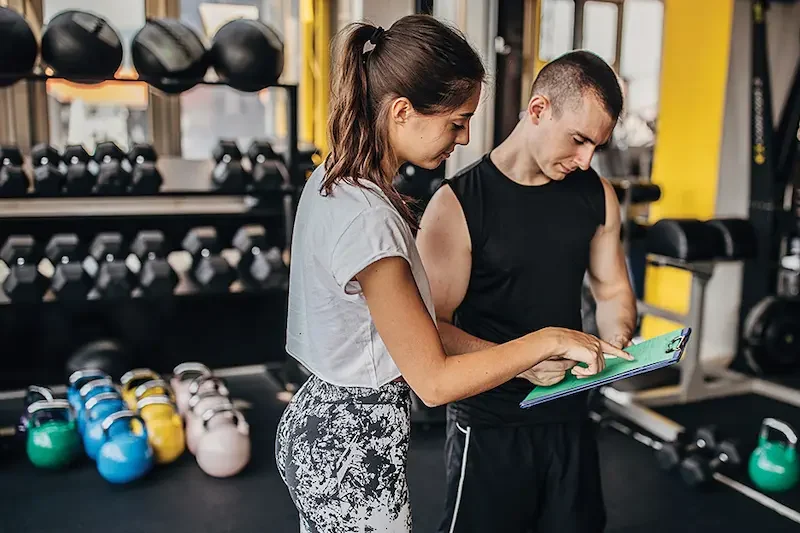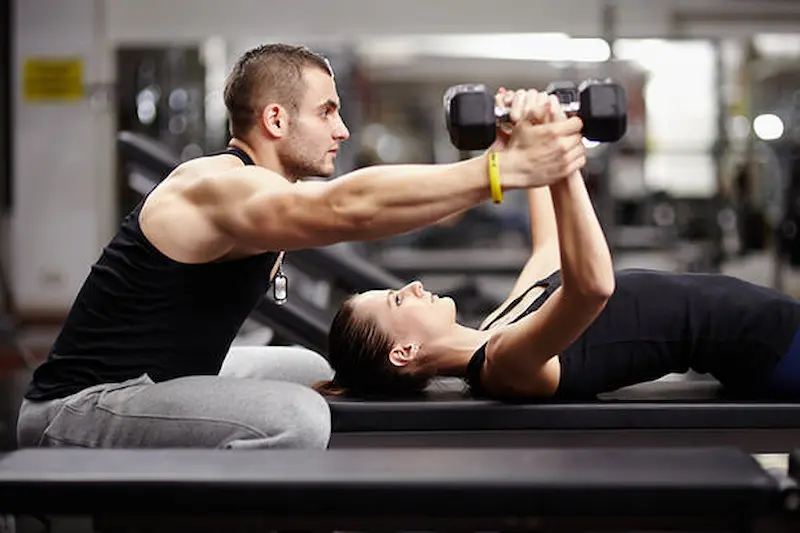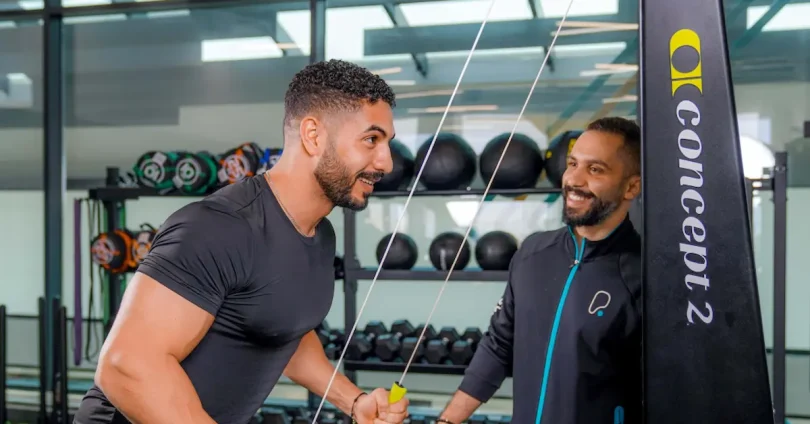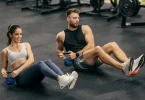Starting your fitness journey can feel exciting but also a little overwhelming. With so many workout plans, gym routines, and online programs available, it can be difficult to know where to begin. The good news is that you don’t need expensive equipment or a gym membership to get started. What matters most is choosing a beginner-friendly program that helps you stay consistent, confident, and motivated. best fitness programs for beginners
Whether your goal is to lose weight, build strength, or simply become more active, there’s a fitness program that fits your lifestyle and energy level. In this guide, we’ll explore some of the best fitness programs for beginners—each designed to help you start at your own pace, stay safe, and see real progress. Let’s find the one that’s right for you and begin your fitness journey the right way.
Why You Need a Beginner-Friendly Fitness Program
When you’re just starting out, it’s important to follow a program that matches your fitness level. Jumping straight into advanced workouts can lead to injuries, frustration, or even burnout. A beginner-friendly fitness program helps you build a solid foundation so you can make steady, long-term progress.
1. It Helps You Avoid Injuries
Beginners often push themselves too hard without proper form or rest. A structured beginner program includes simple exercises, clear instructions, and gradual progress to protect your body from unnecessary strain.
2. It Builds Healthy Habits
Starting slow allows you to focus on consistency rather than intensity. This helps you create a routine you can stick with, making exercise a natural part of your daily life instead of a short-term challenge.
3. It Keeps You Motivated
Seeing small, steady improvements keeps you inspired to keep going. Beginner programs are designed to give you quick wins—like increased energy, better posture, or improved endurance—which help you stay motivated.
4. It Sets Realistic Goals
A good program helps you track your progress and understand that fitness is a journey, not a race. You’ll learn to celebrate small victories and stay focused on gradual improvement.
What to Look for in a Beginner Fitness Program

Starting a new fitness routine can be exciting, but it’s easy to feel lost if you don’t know what to look for. A beginner-friendly fitness program should be simple, safe, and designed to build your confidence step by step. The goal is to help you form healthy habits that last, not to push your limits too soon. Here are the most important things to consider when choosing your first fitness program:
1. Clear Instructions and Proper Guidance
When you’re just getting started, understanding how to do each exercise correctly is crucial. A good beginner program should include clear instructions, video demonstrations, or images showing proper form. Some programs even provide tips for common mistakes, which can help prevent injuries and improve your results. If possible, choose a plan created by certified trainers who know how to guide beginners safely.
2. A Balanced Workout Plan
The best programs don’t focus on just one type of exercise. They combine cardio, strength training, and flexibility to help you develop total-body fitness.
- Cardio exercises (like walking, cycling, or light jogging) strengthen your heart and boost endurance.
- Strength training (using your body weight or light weights) builds muscle and improves metabolism.
- Flexibility training (such as yoga or stretching) increases your range of motion and reduces soreness.
A well-balanced program keeps your workouts interesting and helps you make steady progress in all areas of fitness.
3. Easy to Follow at Home or in the Gym
A beginner program should fit easily into your daily routine. Whether you prefer working out at home or going to the gym, the program should be practical and convenient. Many great beginner programs require little to no equipment—just your body weight, a yoga mat, or a set of resistance bands. Consistency matters more than location, so choose a plan that feels doable and flexible.
4. Gradual Progress and Realistic Challenges
Progressing too quickly is one of the biggest mistakes beginners make. Look for programs that increase difficulty gradually—adding reps, sets, or time only when you’re ready. This approach allows your body to adapt, helping you gain strength and stamina without pain or frustration. A gradual challenge keeps you motivated and prevents burnout.
5. Support and Community Motivation
Having support makes a huge difference, especially when you’re starting out. Some fitness apps and online programs offer virtual coaches, progress trackers, and communities where you can share your journey with others. If you prefer working out in person, look for group classes or beginner-friendly gym sessions. Support and accountability can help you stay on track and make your fitness journey more enjoyable.
6. Focus on Overall Wellness, Not Just Weight Loss
Many people start exercising to lose weight, but a great beginner program goes beyond that. It should also help you improve your posture, energy levels, mood, and confidence. The right program will teach you to see fitness as a way to feel stronger and healthier, not just as a way to change your appearance.
you may also like to read these posts;
30 Day Fitness Challenge at Home: Transform Your Body Fast
Daily Exercise Program for Weight Loss: Burn Fat Fast
Fitness Program to Build Strength: Get Stronger Fast
Online Fitness Training Programs: Get Fit from Home
Full Body Workout Programs for Men: Build Muscle Fast
Best Fitness Programs for Beginners
When you’re new to fitness, the key is to find a program that matches your comfort level, keeps you motivated, and helps you make steady progress. Below are some of the most effective and beginner-friendly fitness programs you can start with. Each one offers unique benefits, so you can choose what best fits your goals and lifestyle.
1. Walking or Jogging Programs
Walking is one of the simplest and most effective ways to start your fitness journey. It strengthens your heart, improves your mood, and helps you build endurance without putting too much strain on your joints.
Why it’s great for beginners: No equipment or gym required. Easy to fit into a busy schedule. Low risk of injury and suitable for all ages.
How to start: Begin with 15–20 minutes of brisk walking three times a week, then gradually increase your time or pace as you get stronger.
2. Beginner Yoga Programs
Yoga focuses on flexibility, balance, and mindfulness. It’s perfect for beginners who want to build strength gently while reducing stress. There are many free beginner yoga programs available online, making it easy to start at home.
Why it’s great for beginners: Improves flexibility and posture. Enhances focus and reduces anxiety. Suitable for all fitness levels.
How to start: Try beginner sessions like “Yoga for Beginners” or “Morning Yoga Stretch” on YouTube or through apps such as Down Dog or Yoga with Adriene.
3. Bodyweight Training Programs
Bodyweight workouts use your own weight as resistance, helping you build strength and tone your body without equipment. Common exercises include squats, lunges, push-ups, and planks.
Why it’s great for beginners: Can be done anywhere, anytime. Builds strength and coordination. Easily adjustable to your fitness level.
How to start: Follow a simple plan like three rounds of 10 squats, 10 push-ups, 10 lunges, and a 30-second plank. Rest between rounds and increase your repetitions as you improve.
4. Low-Impact HIIT (High-Intensity Interval Training)
HIIT workouts alternate between short bursts of exercise and brief rest periods. A beginner-friendly, low-impact version offers all the benefits of HIIT without harsh movements that strain your joints.
Why it’s great for beginners: Burns calories in less time. Improves endurance and heart health. Can be done with or without equipment.
How to start: Try a 15–20 minute HIIT routine using gentle exercises like step jacks, squats, and knee lifts. Rest for 30 seconds between each exercise.
5. Online Fitness Apps
If you prefer guidance and structure, fitness apps can be a great way to start. Many offer beginner-friendly programs, video tutorials, and progress tracking. Popular options include FitOn, Nike Training Club, MyFitnessPal, and Fitbod.
Why it’s great for beginners: Offers step-by-step workouts and reminders. Tracks progress and calories burned. Flexible options for home or gym workouts.
How to start: Download an app that fits your goals—whether it’s weight loss, muscle gain, or flexibility—and follow the beginner plan it suggests.
6. Group Fitness Classes
If you enjoy social settings, group classes can be a fun and motivating way to stay consistent. Classes like Zumba, aerobics, spin, or dance workouts make exercise enjoyable while keeping you accountable.
Why it’s great for beginners: Provides guidance from an instructor. Keeps you motivated with group energy. Fun and interactive way to stay active.
How to start: Join a beginner-friendly class at your local gym or try live online sessions. Always inform the instructor that you’re new so they can help you modify exercises as needed.
7. Swimming Programs
Swimming is an excellent full-body workout that’s easy on the joints. It builds endurance, tones muscles, and improves flexibility while keeping you cool and refreshed.
Why it’s great for beginners: Low-impact and easy on the body. Works every major muscle group. Great for improving breathing and stamina.
How to start: Start with short swimming sessions or water aerobics classes. Gradually increase your duration as you build confidence in the water.
Each of these programs offers something different, so it’s important to choose one that feels enjoyable and sustainable. The best fitness program is the one you can stick with consistently because small, steady progress always leads to big results.
Tips for Staying Consistent and Motivated

Staying consistent is one of the biggest challenges for beginners, but the right strategies can make it much easier. These tips will help you maintain a routine and stay motivated as you progress.
1. Start Slow and Gradually Increase Intensity
Avoid pushing yourself too hard in the beginning. Focus on completing each workout with proper form rather than trying to do too much at once. Gradually increasing the intensity over time helps your body adapt safely and keeps you motivated.
2. Set Realistic Goals
Set achievable short-term goals, such as completing three workouts per week or walking 20 minutes a day. Celebrate small milestones, which will keep you motivated to continue.
3. Track Your Progress
Use a journal, an app, or even photos to track your workouts and improvements. Seeing how far you’ve come is a great way to stay motivated and recognize your progress.
4. Create a Routine
Schedule your workouts at a consistent time each day or week. Treating exercise as a non-negotiable part of your routine makes it easier to stick with it.
5. Find a Workout Buddy or Support System
Exercising with a friend or joining an online community can increase accountability and make workouts more enjoyable. Support from others helps you stay on track even when motivation dips.
6. Make It Fun
Choose activities you enjoy rather than forcing yourself into workouts you dislike. Whether it’s dancing, swimming, or yoga, enjoying your workouts increases the likelihood that you’ll stick with them long-term.
7. Focus on Overall Wellness, Not Just Fitness
Remember that fitness is about more than just weight or appearance. Focus on the improvements in your energy, mood, flexibility, and strength. This mindset helps you stay positive and motivated.
How often should a beginner exercise?
For beginners, 3–5 days a week is ideal. Start with shorter sessions of 20–30 minutes and gradually increase as your endurance and strength improve. It’s important to include rest or active recovery days to allow your body to recover.
Do I need a gym to start exercising?
No, you don’t need a gym. Many beginner programs can be done at home using bodyweight exercises, resistance bands, or simple equipment. Walking, jogging, yoga, and online workout apps are all great options for home fitness.
How long will it take to see results?
Results vary depending on your routine, intensity, diet, and consistency. Beginners often notice improvements in energy, mood, and strength within 2–4 weeks, while visible changes in body shape may take 6–8 weeks or longer.
Can I lose weight with a beginner fitness program?
Yes, a beginner program combined with a balanced diet can help with weight loss. Consistency, gradual intensity, and healthy nutrition are key factors for achieving and maintaining results.
What should I eat before and after workouts?
Before a workout, eat a light snack with carbohydrates and protein, like a banana with peanut butter. After a workout, focus on protein and healthy carbs to aid muscle recovery, such as eggs with whole-grain toast or a smoothie with yogurt and fruit.
Conclusion
Starting a fitness journey can feel challenging, but choosing the right beginner-friendly program makes it easier and more enjoyable. The key is to find a routine that matches your current fitness level, fits your lifestyle, and keeps you motivated. Whether it’s walking, yoga, bodyweight exercises, or an online fitness app, the most important thing is consistency.
Remember to start slow, focus on proper form, track your progress, and celebrate small milestones along the way. Avoid common mistakes like overtraining, skipping rest, or comparing yourself to others. Fitness is a journey, not a race, and every small step brings you closer to your goals.
Take the first step today, stick with it, and enjoy the process. With patience and persistence, you’ll build strength, improve your health, and create lifelong healthy habits.





